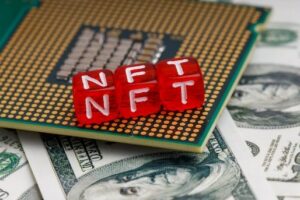
Because it is non-fungible, an NFT guarantees someone’s property over a digital artwork. When it is combined with an artwork, an NFT can be considered as a certificate of authenticity.
Although an NFT is a revolution within the digital world, some issues may be raised. In fact, what about artists’ copyrights in this digital environment? How can artists’ copyrights be protected within NFT platforms? Can an NFT platform be held liable for copyright infringement? There are many proposals for reasonable responses called forth by intellectual property attorneys.
Copyright law is meant to protect artists’ rights over their artistic or literary artworks. Particularly, copyright law protects books, musical artworks, paintings but also database.
Everybody can sell or buy digital artworks on a blockchain. Therefore, what about platforms’ liability? If every one of us can sell or buy artworks, there is absolutely no guarantee that the artworks has been put on the platform by its author. As such, it is fairly common that an artwork put on a blockchain infringes the author’s copyrights. In such case, it is crucial that the author defends for their rights in collaboration with the intellectual property attorneys.
The answer to know whether an NFT platform can be held liable for copyright infringement has been raised in the case Shenzhen Qice Diechu Culture Creation Co. Ltd v. Hangzhou Yuanyuzhou Technology Co., Ltd a.k.a “Chubby tiger having its shot”.
In this case, Ma Qianli, the author of the cartoon at stake gave to Shenzhen Qice Diechu Culture Creation an exclusive license to use his copyright over the “Chubby tiger having its shot” artwork. Defendant, Hangzhou, owns an NFT platform. This latter authorized a third party to sell NFT derivative products of the “Chubby tiger having its shot” artwork. Shenzhen then brought a lawsuit for copyright infringement against the NFT platform.
This decision is important for two reasons. Firstly, it is the first decision where copyright infringement is involved on an NFT platform in China. Secondly, the action is brought against an NFT platform.
The first question raised by this case deals with NFT platforms liability. By definition, a blockchain is decentralized. That means that nobody nor any entity checks the identity of a person.
Therefore, NFT platforms do not check the paternity of an artwork linked to an NFT. A person can sell or buy NFT-artworks and it is not even the author nor a licensee. Hence, counterfeit artworks can freely circulate on NFT platforms, infringing artists/creators’ copyrights.
Because it is difficult to sanction platforms when a content is illicit or infringe someone’s copyright, it is rare for authors to assert their rights on the Web 3.0.
In this case, defendant raises some arguments to avoid liability. First of all, defendant mentions that his platform is a third-party platform. Artworks are downloaded by the platform’s users. This latter cannot be held liable for its users’ activities. Thus, the platform put the concerned NFT on its address form. Therefore, it fulfilled its notification/deletion obligation. At last, a platform cannot divulgate which blockchain has been used nor where the NFT is.
The Internet Tribunal refuses the arguments raised by defendant. In fact, it considers that the platform at stake is a professional platform. Consequently, the Tribunal highlighted a major distinction between NFT platforms. Here, the platform is considered as being a professional NFT platform. The underlying idea is that as soon as a platform is qualified as professional, its liability can be engaged for copyright infringement.
Even though the Tribunal does not when an NFT platform is a professional, it can still be deduced. In fact, the platform at sake is qualified as professional because it proposed transactional services. Consequently, it is a professional NFT platform when it invoices certain percentages fees for each transaction.
Because a transaction has been made and because the platform obtained a financial gain, the platform must fulfil higher obligations when it comes to copyright protection. For example, a professional platform must proceed with preliminary examination regarding the digital artworks’ property that are sold or bought on their platforms. This activity may be efficiently conducted in collaboration an intellectual property attorney.
The Tribunal here considers that the platform failed its duty of care. In this regard, when an NFT platform is professional, it must put in place reasonable measures to check the artworks’ property once they are put on a blockchain by asking to the seller/artist to prove the artworks’ copyright.
The first Chinese NFT copyright infringement was made against a platform since the appellant could not obtain the name of the seller. Claimant, during the proceeding, asked for the seller’s identity in order to sue him for copyright infringement. Consequently, this case is not over yet.
Nevertheless, this case set the pace as for NFT platforms. This decision can be seen as a warning for every NFT platforms which will have to be careful regarding each NFT digital artworks sold or bought on their platforms.
SEE ALSO…
What are the legal issues behind the registration of Off-Chain NFTs?

